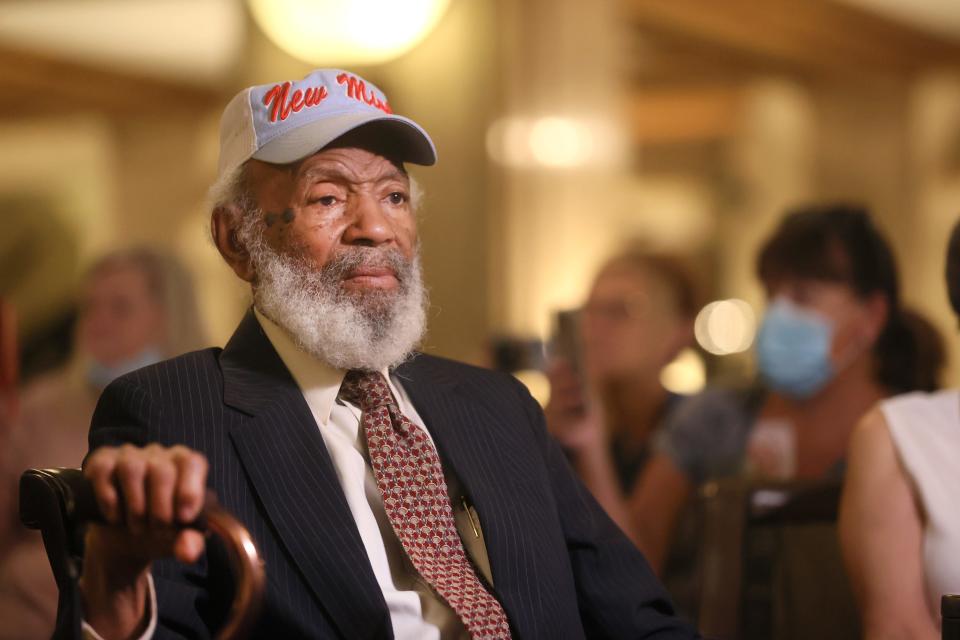[ad_1]
In less than three years, coach Deion Sanders has had an impact on the Jackson State football program that makes it feel like he’s been there much longer.
His accomplishments at JSU have been bigger than just football. He’s thrust the school that produced Walter Payton, Lem Barney, Robert Brazile, and Jackie Slater back into the national spotlight. And he’s transformed the conversation around HBCU athletics in short order.
Jackson State had a stretch from 2014 until Sanders’ arrival in 2020 when it didn’t have any winning seasons.
SPORTS NEWSLETTER: Sign up now for daily updates sent to your inbox

Now, following a program-record 11-win season and a string of other accomplishments that led to Sanders being named FCS coach of the Year, the prospect of Jackson State becoming the first HBCU to play at the FBS level doesn’t seem so far-fetched.
None of this surprises James Meredith, the civil rights icon who integrated Ole Miss after beginning his college career at Jackson State. He visited with Sanders shortly after his arrival in Jackson, and told the Pro Football Hall of Fame member just how impactful he could be.
“I told him it was the most important thing since James Meredith went from Jackson State to Ole Miss,” said Meredith.
Jackson State had never been to the Celebration Bowl, the de facto HBCU national championship game. Sanders led the Tigers there while capturing the program’s first SWAC title since 2007 and drawing an FCS-record 42,293 average home attendance along the way.
Jackson State had never landed a five-star recruit before Sanders took over. Last December, the nation’s No. 1 overall prospect in five-star cornerback Travis Hunter selected the Tigers.
No HBCU athlete or coach had graced the cover of Sports Illustrated since Steve McNair in 1994. Sanders, his son quarterback Shedeur Sanders, and Hunter changed that in June.
Landing recruits like Hunter is particularly impactful, Meredith said, because one of the biggest issues around education in the Black community is the decision that many recruits face when choosing a college.
Should one attend a predominantly white school, such as Ole Miss, which has more resources and better facilities, and deal with the issues that come with being a racial minority there? Or is that student better off attending an HBCU like Jackson State, which has a smaller budget but can offer Black students the freedom to develop within an environment where they aren’t a minority?
Meredith chose Ole Miss because he dedicated his life to improving race relations in Mississippi and was determined to give Black students the freedom to attend whatever school they wanted. He risked his life to get that freedom. But having that freedom doesn’t make the decision any less contentious amongst family members, Meredith said.
“I know more than one family that broke up because a student went to a white school and not the Black school like the parent,” Meredith said. “I know a bunch. And what Sanders did is going to move part of that. Because every school has a good function and the race thing shouldn’t be a part of the decision.”
History has shown that college football, at times, can play an important role in the struggle for larger societal change. A pivotal event that illustrates that point, Meredith said, came in 1970 when Southern Cal became the first integrated college football team to play in Alabama. The implications of Southern Cal’s victory over all-white Alabama rippled through the entire SEC and beyond.
Meredith believes Sanders can have a similar impact at JSU. He hopes that the success Jackson State’s football program is having will translate into better financial opportunities for the school and HBCUs in general.
“The most important thing that happened in the black-white thing in America was when (Alabama coach) Bear Bryant said, ‘I ain’t going to let them northern and western schools use my boys to kick my butt no more.’ ” Meredith said. “Now, the next most important thing was Deion Sanders saying, ‘I’m going to go to that formerly black school and make it top.’ That’s great for football, that’s great for all sports, but it’s greater for academic education. There ain’t never been, to my knowledge, any school in Mississippi financed as well or on par as Ole Miss.”
This article originally appeared on Mississippi Clarion Ledger: James Meredith to Deion Sanders: Coaching Jackson State ‘important’
[ad_2]
source
